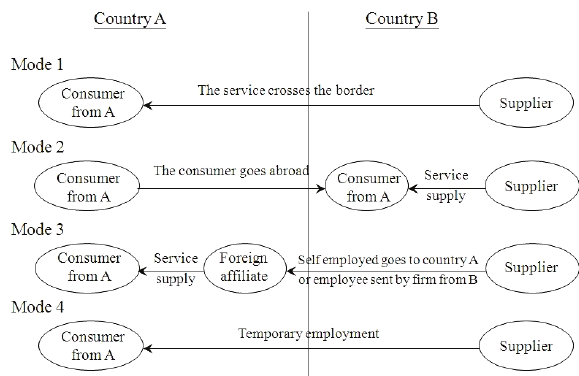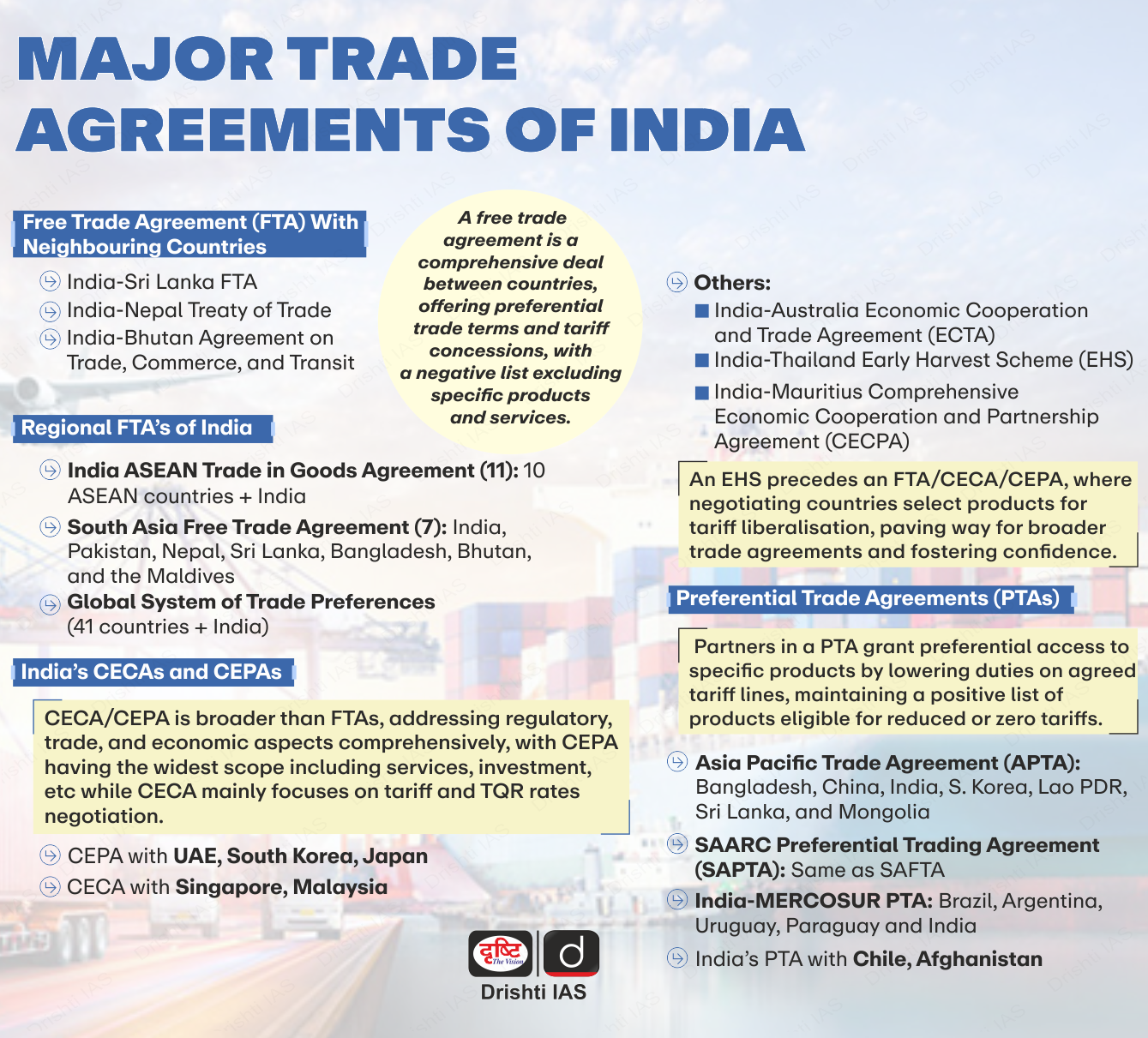Economy
India-EFTA Trade Deal
- 18 Mar 2024
- 8 min read
For Prelims: Trade and Economic Partnership Agreement, European Free Trade Association, Data exclusivity, Intellectual Property Rights, India-Norway Task Force on Blue Economy for Sustainable Development.
For Mains: Key Developments in India’s Economic Diplomacy, India and EFTA Relations.
Why in News?
India and the European Free Trade Association (EFTA) recently signed the Trade and Economic Partnership Agreement (TEPA).
- India previously rejected the inclusion of "data exclusivity" clauses in the agreement which would have restricted Indian pharmaceutical companies from producing generic drugs.
- Now, India and EFTA agreed to exclude the most "sensitive" agricultural products and gold imports from the pact.
What are the Key Highlights of the TEPA?
- About: The India-EFTA trade deal was finalised a decade after initial negotiations broke down in 2013 due to disagreements.
- Recent geopolitical changes and a shared goal to reduce dependence on China facilitated the agreement.
- TEPA comprises 14 chapters with a main focus on market access related to goods, rules of origin, trade facilitation, trade remedies, sanitary and phytosanitary measures, technical barriers to trade, investment promotion, market access on services, intellectual property rights, trade and sustainable development and other legal and horizontal provisions.
- Key Points:
- EFTA Commitments: To increase foreign direct investments in India by USD 100 billion over 15 years. The investments do not cover foreign portfolio investment.
- Target to generate 1 million direct jobs in India through these investments.
- Commitments related to Intellectual Property Rights in TEPA are at the Trade-Related Aspects of the Intellectual Property Rights level.
- Tariff Offers: EFTA offers 92.2% of tariff lines covering 99.6% of India's exports.
- India offers 82.7% of tariff lines covering 95.3% of EFTA exports.
- India excludes sectors like dairy, soya, coal, and sensitive agricultural products from tariff concessions.
- Mutual Recognition: TEPA has provisions for Mutual Recognition Agreements in Professional Services like nursing, chartered accountants, architects etc.
- Market Integration: TEPA provides an opportunity for India to integrate into EU markets.
- Over 40% of Switzerland’s global services exports are to the EU.
- Indian companies can look to Switzerland as a base for extending its market reach to the EU.
- Services Offer From EFTA: Services offered by EFTA include better access through digital delivery of Services (Mode 1), commercial presence (Mode 3) and improved commitments and certainty for entry and temporary stay of key personnel (Mode 4).
- EFTA Commitments: To increase foreign direct investments in India by USD 100 billion over 15 years. The investments do not cover foreign portfolio investment.
What is the European Free Trade Association?
- About: The EFTA is the intergovernmental organisation of Iceland, Liechtenstein, Norway and Switzerland (all four are not a part of the EU).
- It was founded by the Stockholm Convention in 1960.
- It aims to promote free trade and economic integration to the benefit of its four Member States and their trading partners around the globe.
- India and EFTA: India is the EFTA's 5th-largest trading partner after the European Union, the United States, Britain and China.
- Two-way trade between India and EFTA was USD 18.65 billion in 2022-23, with a trade deficit of USD 14.8 billion for India.
- Switzerland is India's largest trading partner in this bloc of nations, followed by Norway.
- The biggest exports to India were pharmaceutical items (11.4%) and machinery (17.5%), while organic chemicals (27.5%) made up the majority of EFTA imports.
- Two-way trade between India and EFTA was USD 18.65 billion in 2022-23, with a trade deficit of USD 14.8 billion for India.
Note
TEPA is the 4th major deal signed by India to promote trade and economic cooperation in the last 3 years. The others are with Australia, Mauritius and the UAE.
How are India’s Relations with EFTA Nations?
- India and Norway
- India and Norway have been enjoying a cordial and friendly relationship since the establishment of relations in 1947.
- Norway’s first Consulates in India opened in Kolkata and Mumbai in 1845 and 1857, respectively.
- Norway has supported India’s membership to export control regimes the Missile Technology Control Regime (MTCR), the Wassenaar Arrangement (WA) and the Australia Group (AG).
- In 2020, the India-Norway Task Force on Blue Economy for Sustainable Development was inaugurated jointly by both countries
- HIMADRI, India's first research station is located at the International Arctic Research base, NyAlesund, Svalbard, Norway.
- India and Switzerland Relations:
- Switzerland established diplomatic relations with India soon after Independence. A Treaty of Friendship between India and Switzerland was signed at New Delhi on 14th August 1948.
- India is Switzerland’s 4th-largest trading partner in Asia and the largest in South Asia.
- More than 300 Swiss companies such as Nestle, Holcim, Sulzer, and Novartis operate in India, while Indian IT majors TCS, Infosys and HCL work in Switzerland.
- India and Iceland
- India and Iceland established diplomatic relations in 1972 and have strengthened their ties since 2005 with high-level visits and exchanges.
- Iceland was the first Nordic country to publicly extend support to India's candidature for permanent membership in the United Nations Security Council (UNSC).
- India and Iceland recently entered into a MoU to explore collaboration in renewable energy, green hydrogen, decarbonization initiatives, and geothermal energy.
- India and Liechtenstein
- India and Liechtenstein established diplomatic relations in 1993
- As per RBI’s data, the FDI inflow from Liechtenstein amounts to USD 44.68 million from April 2000 to March 2020.
UPSC Civil Services Examination, Previous Year Questions (PYQs)
Prelims
Q.‘Broad-based Trade and Investment Agreement (BTIA)’ is sometimes seen in the news in the context of negotiations held between India and (2017)
(a) European Union
(b) Gulf Cooperation Council
(c) Organization for Economic Cooperation and Development
(d) Shanghai Cooperation Organization
Ans: A
Q. Consider the following countries: (2018)
- Australia
- Canada
- China
- India
- Japan
- USA
Which of the above are among the ‘free-trade partners’ of ASEAN?
(a) 1, 2, 4 and 5
(b) 3, 4, 5 and 6
(c) 1, 3, 4 and 5
(d) 2, 3, 4 and 6
Ans: (c)
Q. The term ‘Regional Comprehensive Economic Partnership’ often appears in the news in the context of the affairs of a group of countries known as (2016)
(a) G20
(b) ASEAN
(c) SCO
(d) SAARC
Ans: (b)








